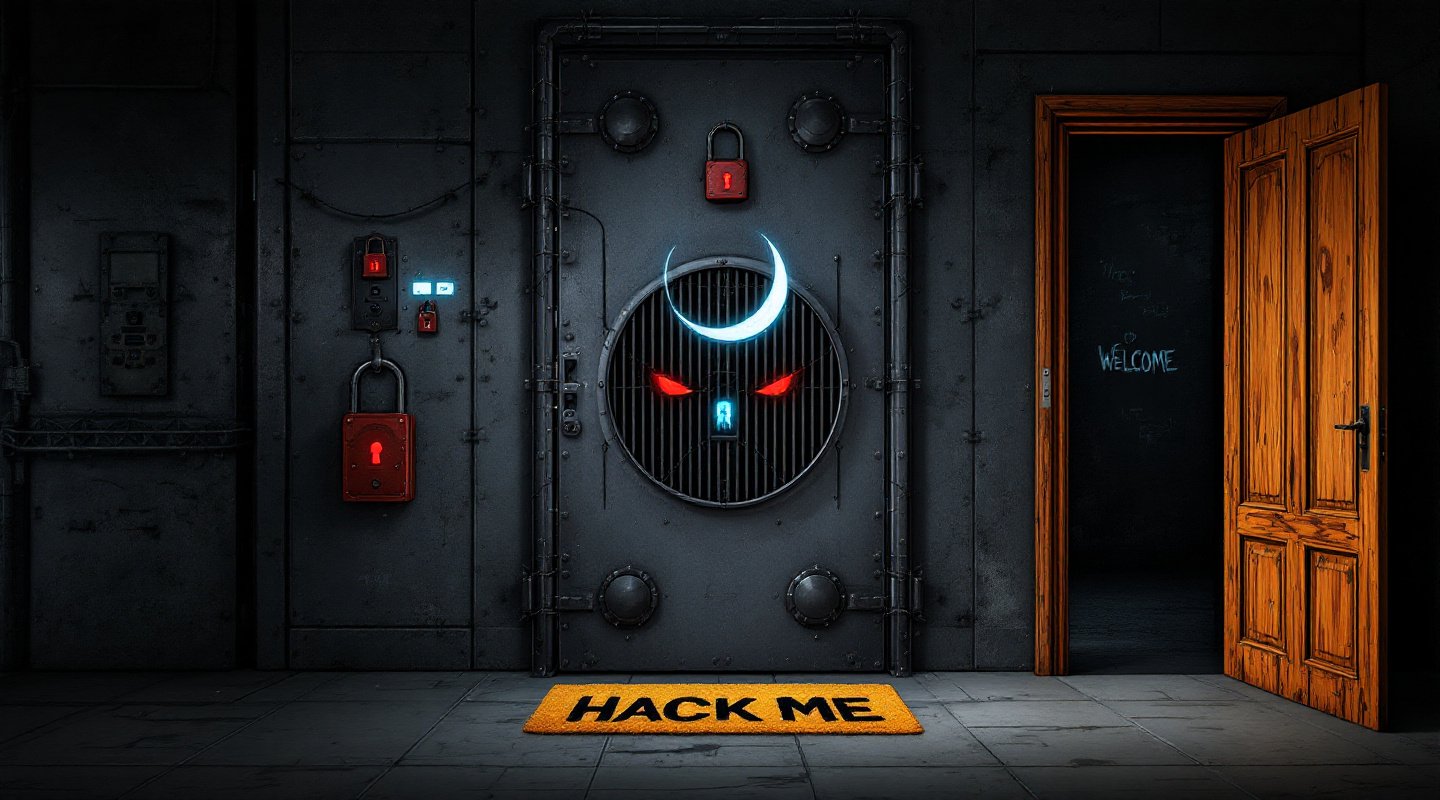
The Small Business Cyber Security Guy
Welcome to my personal blog — a space where I share my own views, opinions, and insights on technology, cyber security, and the realities of working in IT.
This blog is entirely personal. The thoughts and opinions expressed here are mine alone. They do not represent the views, policies, or positions of my employer, past or present, or any organisation I’m associated with professionally or personally.
Expect a mix of:
Straight-talking advice for small businesses
Honest takes on cyber security and IT trends
The occasional rant
A few war stories from the frontlines (names removed to protect the guilty)
With over 40 years in the industry, I’ve seen a lot — some of it brilliant, some of it baffling.
This blog is where I unpack all of it.

How Long Has a Hacker Been Living Rent-Free in Your Business? IBM's Dwell Time Report Explained for UK SMBs
A hacker could be hiding in your business for over nine months before you even notice—and IBM has the stats to prove it. Their latest report shows UK small businesses are dangerously exposed to long dwell times, where cybercriminals quietly steal data, cause chaos, and vanish before anyone sounds the alarm. If you're not actively looking for threats, you're practically inviting them in. Here's what dwell time means for your business—and how to slam the door shut.

NHS Software Supplier Ransomwared – Gets a £3M Discount for Being Helpful?
So naturally… the ICO fined them £4.4 million.
And then knocked £3 million off for being helpful afterwards.
Yes, really. That’s the cybersecurity equivalent of “you crashed the car but said sorry nicely—so we’ll waive the repair bill.”
I’ve written a new piece on this absolute masterclass in weak governance, supplier accountability theatre, and the dangerous precedent it sets.

UK Businesses Under Siege: Over Half Hit by Cyberattacks in 2024—Are You Next?
Over half of UK businesses got digitally f**ked last year—and most didn’t even realise until it was too late. While leadership played buzzword bingo, ransomware crews strolled in through weak passwords and forgotten patches. Attacks hit every 44 seconds. Still think “we’re too small to be a target” holds up? It doesn’t. Hope isn’t a strategy. Luck isn’t resilience. And if you’ve got no plan, you’re just waiting to be the next headline.

Microsoft Breaks Remote Desktop (Again): What SMBs and IT Pros Need to Know
Microsoft’s at it again—this time breaking Remote Desktop for Windows 11 users with their latest round of updates. If your helpdesk tickets are piling up with RDP disconnects and login weirdness, you’re not alone.
From silent session drops to broken smart card authentication, this bug is hitting SMBs and IT pros where it hurts. We unpack what’s going wrong, who’s affected, and how to survive it—while Microsoft casually promises a fix “at some point.” Spoiler: rollback might be your only friend.

Why London's 5G is the Worst in Europe (But It Doesn’t Have to Be)
London ranks dead last for 5G performance in Europe – but it’s not just the capital struggling. Across the UK, coverage is patchy, motorway connectivity is unreliable, and performance wildly varies between networks.
Yet where it’s deployed properly, UK 5G can rival the best on the continent.
The problem? Not the tech – the execution. Less hype, more follow-through, and a proper plan could turn the UK’s 5G fortunes around.

Your Office Spends More on Coffee Than Cybersecurity Training—and That’s How You Get Hacked
Most UK businesses spend more on coffee than on Cyber Security Awareness Training—and that’s exactly how breaches happen. Your biggest threat isn’t a hacker in a hoodie; it’s Dave in Sales clicking a dodgy email.
The good news? Quality training is cheap, effective, and actually enjoyable. For less than the cost of your weekly latte run, you can turn your staff from cyber risks into cyber defenders.
Still think you can’t afford it? Think again.

Fake CAPTCHAs Are Now Malware Traps – Because Of Course They Are!
Think you’re safe clicking through a CAPTCHA? Think again. Cybercriminals are hijacking your trust with fake CAPTCHA pop-ups that trick you into downloading malware—by following simple keyboard instructions you’d never question. One click and boom—your passwords, wallets, and entire digital life are up for grabs. This isn’t just clever, it’s terrifyingly effective. If you’ve ever hit "I’m not a robot," you need to read this before you hand your system over to hackers.

Your Bluetooth Devices Might Be Spying on You – And It’s Not Even Your Fault
Think your Bluetooth devices are safe? Think again. Security researchers just found hidden, undocumented commands in the ESP32 chip—used in over a billion devices worldwide. This means hackers could exploit your smart gadgets, from speakers to security cameras, without you ever knowing. And the best part?
Manufacturers didn’t tell anyone. Is your tech spying on you? Maybe. Here’s what you need to know—and how to protect yourself before it’s too late. 🚨

DrayTek Disaster: Why Your Business Wi-Fi Just Became a Cybersecurity Liability
A critical flaw in DrayTek routers is wreaking havoc on UK broadband connections — and no, this isn’t just a “techie problem.” Businesses across the country are unknowingly running vulnerable, outdated routers that are now being blocked by ISPs for good reason.
DNS hijacks, remote code execution, and silent compromises are all in play. If you're still clinging to your 2018 networking gear like it’s a family heirloom, it’s time to wake up. This isn’t about cost — it’s about negligence. Here’s what’s going on, why it matters, and what to do before your internet (and reputation) vanishes.

2-Step Verification: The Absolute Bare Minimum for People Who Actually Give a Damn
If you're still not using 2-Step Verification (2SV), you might as well leave your front door wide open, bake some cookies for the burglars, and leave a note that says, "Take what you like, I clearly don’t give a shit." Sounds ridiculous? So does ignoring the absolute bare minimum of online security. Passwords alone are about as effective as a chocolate teapot, and cybercriminals love people who think 2SV is “too much hassle.” If typing in a short code now and then feels like a chore, maybe the internet isn’t for you. Get 2SV enabled before you end up Googling, "What to do when my bank account is emptied?"

Lazarus Strikes Again: North Korean Hackers Crash the NPM Party
North Korea's Lazarus hackers are back, gleefully slipping malicious code into popular NPM packages—think razor blades hidden in your Halloween sweets. Hundreds of developers unwittingly invited cybercriminals into their digital lives, losing sensitive data and perhaps some self-respect. This latest supply-chain fiasco underscores a crucial lesson: trust no package blindly.
Treat your code dependencies like milk—check regularly, or risk finding something unpleasantly chunky in your morning coffee. Vigilance isn't optional; it's essential.

You Wouldn't Share Your Toothbrush—So Why Share Your Password?
Discover why sharing your password is just as gross—and risky—as sharing your toothbrush. Learn practical tips like the three-random-words method and how password managers keep your digital hygiene squeaky clean!

Choosing an MSP: Swipe Left on These IT Horror Stories
Thinking of hiring an MSP? Don’t swipe right just yet! 🚩 From laughably cheap pricing to alarming shared tenants and MSPs holding your admin access hostage, we're exposing the worst IT provider red flags.
Learn how to dodge the charm, avoid costly mistakes, and choose a provider who won't leave your business exposed. Your business deserves better—don't settle for IT nightmares!

Microsoft 365 Business Premium: Why Saving £7 a Month Could Cost Your Business Its Future

The Great Bargain of Cheap IT Support: A False Economy That’ll Cost You Dearly
Cheap IT support might seem like a bargain, but it’s a financial and security disaster waiting to happen. The majority of budget IT providers lack even basic externally audited cybersecurity certifications like Cyber Essentials Plus—which should be a minimum requirement. They cut corners on security, response times, and expertise, leaving businesses vulnerable to downtime, data breaches, and compliance fines. A proper MSP invests in real security, 24/7 monitoring, and incident response—and that costs at least £60 per user per month. Before you sign that ‘too good to be true’ IT contract, ask the hard questions, or risk learning the expensive way.

Cyber Essentials and Privileged Access Management: Just Enough or Just in Time?
Still letting employees run wild with admin rights? Cyber Essentials says NO MORE. The latest crackdown on privileged access means Just in Time (JIT) is OUT, Just Enough Access (JEA) is IN, and ThreatLocker is here to save your sanity. Ignore this at your own risk—hackers love lazy security!

Microsoft Accidentally Nukes Copilot – Because Of Course They Did
Just when you thought Microsoft couldn't top their Exchange meltdown, they go full send and accidentally delete their own AI assistant from Windows 11. No warning, no prompt—just poof. Gone. It's as if someone at Redmond duct-taped down the ‘F**k Around and Find Out’ button and walked away.
What’s next? Windows Update deciding Task Manager is ‘problematic’? Edge forcibly replacing all your passwords with ‘BingLovesYou123’? Buckle up—because this one’s a mess. Read on and prepare to rage.

WTF Happened to X? Is It Even Relevant Anymore?
Elon Musk took Twitter, rebranded it as X, and somehow made it an even bigger dumpster fire. Outages, bots, advertisers bailing—has X become the digital ghost town we all expected? Or is it just the billionaire’s latest expensive toy gone rogue? Let’s break down this glorious trainwreck

In-House IT vs. MSP: The Real Cost of IT Support for Businesses
Should your business handle IT in-house or outsource to a Managed Service Provider (MSP)? On paper, an in-house IT team might sound ideal—until you see the real costs. A single IT manager can set you back £80K+ a year, and that’s before factoring in security tools, compliance, and the inevitable sick days. Meanwhile, a properly managed MSP delivers 24/7 support, robust cybersecurity, and compliance-ready solutions—at a fraction of the price. If your IT plan is to rely on “Dave from accounts” to fix the Wi-Fi, good luck. The smarter choice? Investing in IT before disaster strikes.

Microsoft Exchange Online: How the Actual F*!# Do You Break Email for a Week?
For seven excruciating days, Microsoft completely broke email transport, crippling businesses worldwide. A botched update turned the simplest, most stable IT function into a flaming dumpster fire, leaving users helpless while Microsoft sat in silence for three days before admitting anything was wrong.
How do you screw up SMTP, MAPI, and basic email delivery in 2025? How does a trillion-dollar company make email less reliable than it was in the 1980s? And more importantly—why should you still trust Microsoft 365 after this catastrophic f*-up? Buckle up, we’re diving in!
⚠️ Full Disclaimer
This is my personal blog. The views, opinions, and content shared here are mine and mine alone. They do not reflect or represent the views, beliefs, or policies of:
My employer
Any current or past clients, suppliers, or partners
Any other organisation I’m affiliated with in any capacity
Nothing here should be taken as formal advice — legal, technical, financial, or otherwise. If you’re making decisions for your business, always seek professional advice tailored to your situation.
Where I mention products, services, or companies, that’s based purely on my own experience and opinions — I’m not being paid to promote anything. If that ever changes, I’ll make it clear.
In short: This is my personal space to share my personal views. No one else is responsible for what’s written here — so if you have a problem with something, take it up with me, not my employer.
